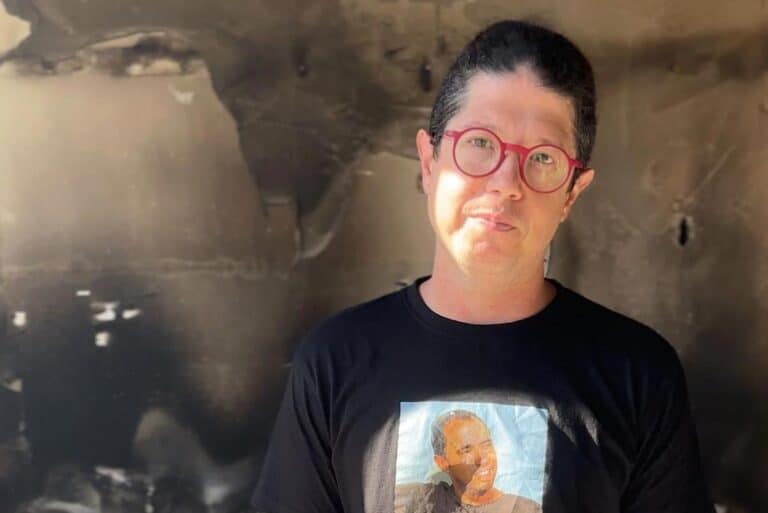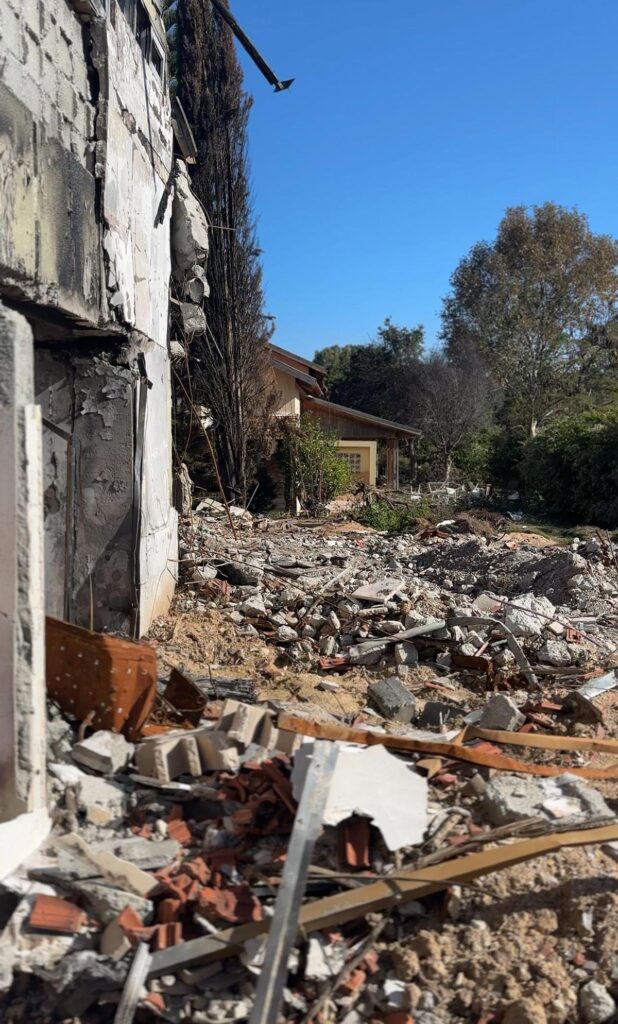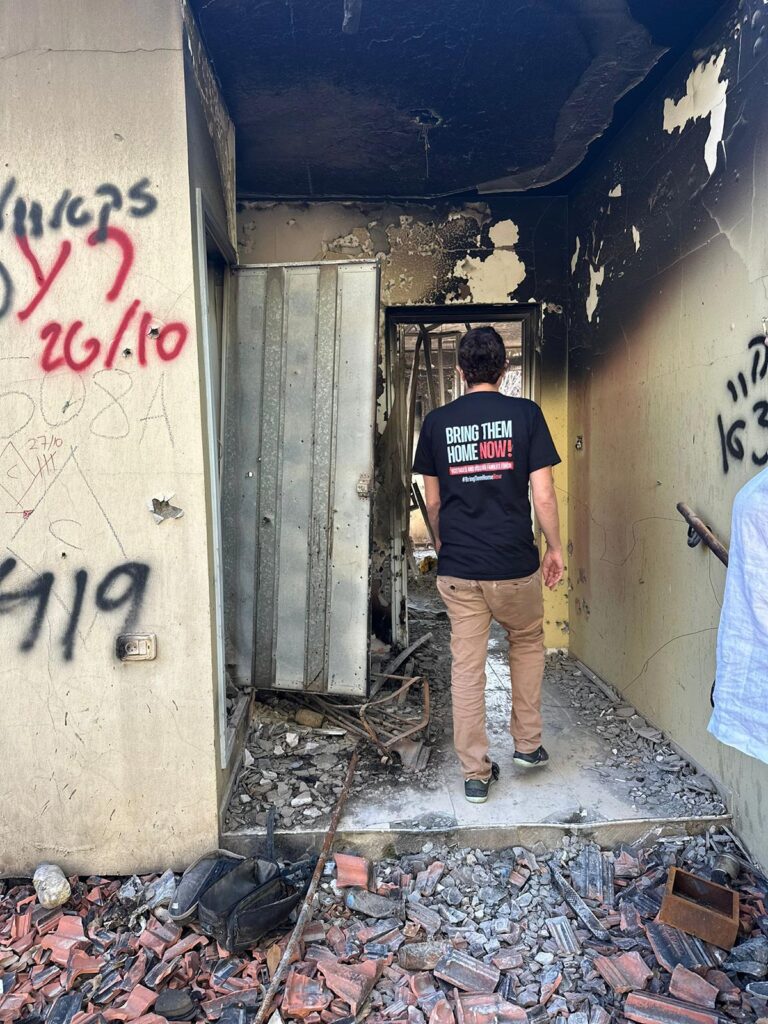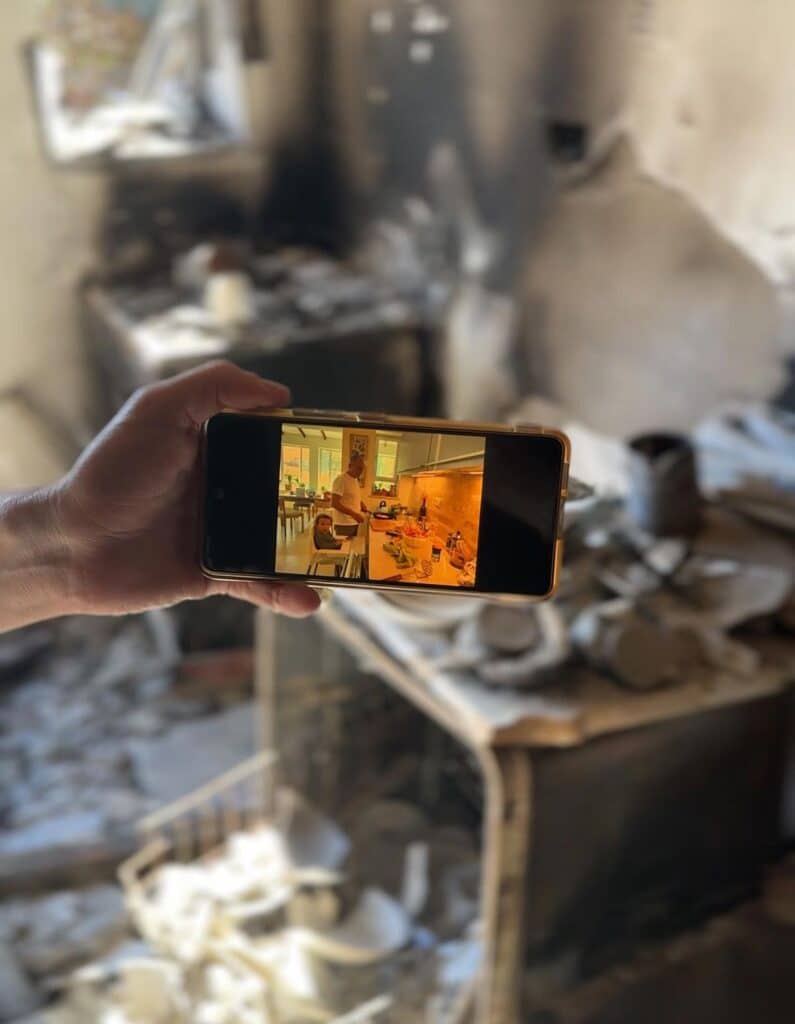
After a nearly two-hour drive south from Herzliya, Yuval Haran pulled onto his childhood street in Kibbutz Be’eri. He opened the door to his car and stepped out onto the street where he has lived most of his life.
Haran has parked in this spot and stepped onto the sidewalk thousands of times. Typically, he was met by his father tending the fruit trees in his yard while his sister Adi’s children looked down on their grandfather from the home’s rooftop patio.
But since Oct. 7, stepping out onto this street has been different. The home he once knew, reduced now to rubble, is no longer filled with life and joy, but is a harsh reminder of the life that his family lost.

Since that dark day, Haran has been wearing the same black t-shirt with the face and name of Tal Shoham, his brother-in-law, and the words “Bring them home” in large letters on the back. He has been taking visitors through Be’eri, which is located on the southern border of Israel just miles from Gaza, to share his family’s story.
As I walked with Haran to the front door of his childhood house, just a few hundred meters from his current home in the kibbutz, he began to tell the tale of that Black Shabbat. He wasn’t in Be’eri that weekend as he was attending a music festival in Eilat.
“You can’t tell now, but this used to be one of the most beautiful homes on the kibbutz. The yard was full of fruit trees my father planted,” he told me.
As terrorists infiltrated Kibbutz Be’eri, Haran’s family was at home celebrating the holiday of Simchat Torah. “My father didn’t care which holiday it was, as long as we were together, preferably sitting around a table and eating.”
The Haran family home — where his parents live — sits just half a dozen houses from the edge of the kibbutz closest to the border, the neighborhood of the kibbutz that took the hardest hit during the attack.
He lost contact with his family by 10:30 am that morning and later heard the story of what happened from his family and neighbors at the kibbutz.
“Early in the morning on October 7, I received notice from my family that a siren had sounded in the kibbutz and my family moved into the mamad,” which is a reinforced room in their home meant to be a safe space during rocket attacks.
“After a few minutes, my mother went out to make the grandchildren hot chocolate. We all assumed it was just typical rocket fire from Gaza and that it would end as quickly as it started. I stayed in contact with them over WhatsApp for as long as I could, until the connection was fully cut off.”
From the kibbutz’s WhatsApp group, Haran gained clues as to what happened to his family as the attack continued to unfold. “Later, my family told me that as soon as they began to hear screams and gunshots flying by the window, they knew that this was different. There were terrorists on the kibbutz.”
“My mother, sister, and her two kids all hid under the bed in the mamad. My father and brother-in-law Tal stood at the door, attempting to hold the door closed and prevent entry. After about two hours of waiting, the terrorists began their attack on my home.”
Haran moved to the right to point to the side of the house where the mamad window sat open, “They broke open this window and pulled my family out, first taking the men, my father and brother-in-law, before dragging the women and children out. They tried to separate my sister, Adi, from her kids but she wouldn’t let them. The last words that I was told my father said were, ‘This is it, it’s over.’”

Before entering the home, Haran motioned to the sides of the house, pointing to a missing staircase and the ground which was covered in citrus that was beginning to rot.
As he stood in front of the ruins of his family home, he recalled the urgency he felt to get someone to visit his parents’ home and look for clues as to where his family was.
His hope was that they were still there, hiding, waiting to be told it was safe to come out. But, sadly, that was not the case. A day and a half later, Haran received news that the home was empty, and one and a half weeks later, it was confirmed that his father, Avshalom, was murdered. He was 66 years old.
The rest of his family — including his sister’s two young children, Naveh and Yahel, his aunt Sharon and her 12-year-old daughter Noam — were taken as hostages in Gaza.
Haran entered the home through the front doorway, the sound of rubble crunching beneath his sneakers. He stepped into the large living area that used to house the kitchen and dining table where his family often gathered.
“It is hard for me that people only see the house this way,” he told me, taking out his phone to show an image of what the kitchen used to look like. It was unrecognizable now, with a missing wall and only the remnants of the dishwasher visible.

The rest of the home was in a similar state. There wasn’t much left. The living room was lined with hostage posters featuring the faces of Haran’s family.
During the ceasefire-hostage deal at the end of November, six members of the family were returned to Israel and reunited with Haran. However, Tal Shoham remains in Gaza, along with 100 other civilian hostages, who have been held for nearly 100 days.
Nearby, we saw dozens of other houses on the kibbutz in a similar state of disarray. These homes were missing entire rooms, had roofs caving in, and were marked with spray paint, which told the story of what rescue squads found in the aftermath of the brutal attack.
As the person in charge of information technology at the kibbutz, Haran could name the residents of every house he passed on his tours, and not only did he know their wi-fi passwords, but he also set them.
While passing by a row of destroyed homes, he looked up and said quietly, “I can talk about it without mentioning names, but if I think about the people who lived here…” and he couldn’t quite finish the sentence.
Every family in Kibbutz Be’eri, home to dozens of people who had dedicated their lives to peace and a better future, has a story of that Black Saturday. Haran said it is the strangest feeling in the world to see people touring his home, seeing it destroyed as opposed to the beautiful oasis he preferred to think of.
Haran is now dedicated to sharing the story of his family and what happened at Kibbutz Be’eri on Oct. 7. Over the last 100 days, he has also been active in advocating for the release of Tal Shalom and the other hostages who remain in Gaza.
“We’re all worried sick for Tal and all of the hostages, their lives are in danger and we need them back. If I could ask one thing from everyone around the world, it would be this: Think of what you would do if it were your brother, sister, or mother who was taken hostage, and do that. We need all the help we can get.”
Originally Published Jan 10, 2024 01:10PM EST
